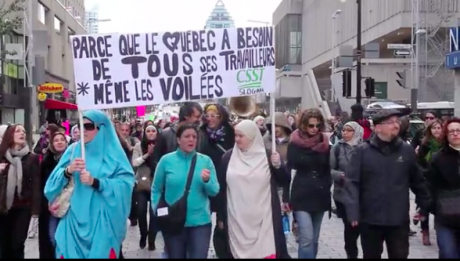Features
You are here
Opposition exposes and challenges racist PQ Charter

October 28, 2013
Since we last updated you on this issue, the PQ has stopped pretending its so-called Values Charter has anything to do with values, and is now blatantly fanning the flames of racist populism—attempting to paint Muslims in particular as dangerous radicals and pitting feminists against Muslims in the process.
In late September, Quebec Parti Québecois Premier Pauline Marois appointed four new members of the Conseil du statut de la femme (Status of Women Quebec). Conseil President Julie Miville-Dechêne stated publicly that Marois had packed the board to tip the balance in favour of the values charter, which would impede the Conseil’s independence and distance from the government.
Islamophobia
First, on October 15, the so-called “Janettes,” a group of twenty notable Quebec women, came out in support of the Values Charter. Their public statements made a mockery of feminism, with one woman calling women who wear a hijab “crazy” and another saying she would be afraid to be treated by a doctor who wore one. These statements thankfully backfired, with an immediate response from Québec solidaire (QS) spokesperson and MNA Françoise David, who said the comments were completely unacceptable. As it turns out, one of the main drivers of the letter was Julie Snyder, partner of corporate Québecor media mogul Pierre Karl Péladeau, a longtime PQ supporter.
In the days that followed, members of Marois’ Cabinet made inflammatory remarks in the media about two issues. First, Bernard Drainville, Minister in charge of the Values Charter project, stated that he wanted to regain the ground supposedly lost for women’s equality as result of unnamed previous religious accommodations. This statement was a blatant attempt to suggest that such accommodations always work against women.
The same day, Agriculture minister François Gendron threatened criminal charges for what appears to have been a lawful slaughter of sheep in accordance with religious requirements at a farm in Mont-Saint-Grégoire—a statement that tried to draw on the brief frenzy around the question of Halal meat production, also provoked by the PQ in 2012.
Charter opposition grows
Meanwhile, other voices against the Charter are also growing in number--including a number of demonstrations that have united thousands of people from diverse religions, and no religion, in the streets.
Aside from the Manifesto for an Inclusive Quebec, which now boasts over 26,000 signatures, October saw the Association québécoise d'établissements de santé et de services sociaux (AQESSS - Association of health and social services institutions) come out against the Charter—a statement significant for both its source (CEOs and chairs of boards, for the most part) and for the fact that these agencies are largely government funded. They stand opposed to the Charter because they have never had any problem with religious accommodation and saw no issue with the wearing of religious symbols. They also expressed concerns that the proposed ban will have negative effects on recruitment and retention of qualified staff, on work and research, and on the workplace climate.
On October 15, the Quebec Human Rights Commission came out against the Charter with a lengthy report that slammed the proposal for its departure from the Quebec Charter of Rights and Freedoms, the Canadian Charter of Rights and freedoms, and international law, saying it misinterprets the duty of state neutrality and would set dangerous precedents for other kinds of accommodations required under the Quebec Charter.
Québec Solidaire
On October 20, Québec Solidaire held a public meeting, that welcomed over 200 people in Montreal, to discuss the issue and promote its proposed alternative—a “Charte de laicité,” (Secularism Charter) which would protect the secular nature of the state without banning any types of clothing by public servants.
Unfortunately, the QS proposal still advocates that public services should be delivered and received with an uncovered face, “except in emergency situations”—and fails to define "emergency," thus falling into the trap set by the Liberals when they tabled the controversial Bill 94 in 2012 against the niqab (full face-covering).
But on this front, there is cause for optimism. In 2007, QS took a watered-down and qualified position against war in Afghanistan. Because QS, unlike other parties, is a party of the ballot box and of the streets, and acts on its convictions, it became involved in the anti-war movement. As a result it was exposed to the concrete effects of false debates about protecting Afghan women and spreading democracy. Its starting point may have been weak, but it gave QS enough of a footing upon which to strengthen its positions when tested in practical activism.
Today, QS is the only party on the front lines defending religious communities from the PQ charter. The concession to opponents of the niqab contained in its proposed Secularism Charter ("Charte de laicité") is likely to fall away as QS is exposed through practical political activity to the lack of logic of this position.
QS has shown in the past that it can learn and evolve. Activists in Quebec should support QS, but continue to work within it to improve its position on all forms of discrimination. And activists outside of Quebec should value that there is a voice that seeks to be beacon of anti-racism in the debate, even if its position is evolving along with the popular movement it represents.
Section:










